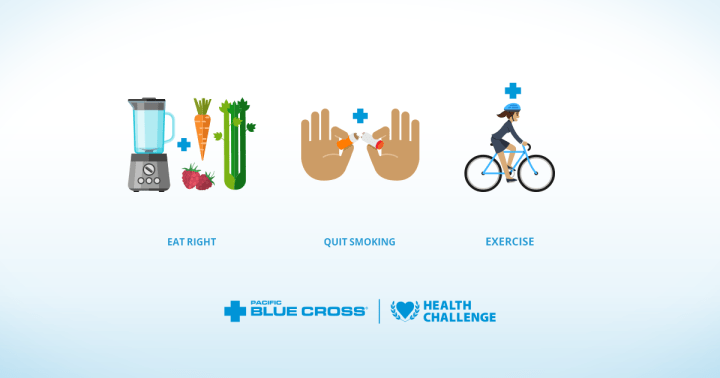It’s a predictable pattern: we indulge during the holidays, then make New Year’s resolutions to be healthier and eventually fall back into old habits.

It isn’t easy making lasting lifestyle changes, but with better understanding of how habits form, we have better odds of success.
According to Charles Duhigg, author of The Power of Habit, a four-step process is responsible for habit creation: cue, craving, response and reward.
For example, you wake up in the morning and want to feel alert, so you drink a cup of coffee and feel energized to start your day. Eventually, you associate the response (feeling alert) with the cue (waking up) and the behaviour becomes automatic.
“When we have the same stimulus and response over and over again, we create pathways in our brains,” explains Megan Kaulius, health and wellness program manager at Pacific Blue Cross.
The good news is that once you’ve replaced a bad habit with a good one, it should stick, research shows. There are also excellent tips and programs to help you achieve your goals like Pacific Blue Cross’s online Health Challenge. It’s a free tool that helps people kickstart their wellness plans and have fun in the process. Improve your outcomes and your health by trying these tried-and-true tactics, presented in partnership with Pacific Blue Cross.
Set goals and make a plan
If you set SMART goals—specific, measurable, achievable, relevant and timely—you’re much more likely to succeed, says Macy Lai, a registered psychologist with Pacific Blue Cross.
A goal to walk three times a week for 30 minutes and do it for three months hits all the marks, for example.
“Treat a behaviour change like an experiment rather than something you’re going to do for the rest of your life,” she says. “It will be easier to stick with it, and the results are more likely to be positive.”
When you do slip up, which is inevitable, don’t beat yourself up. “A ton of research has shown positive results around using self-compassion in behaviour change, especially when things get really tough and we fall off the wagon,” Kaulius says.
“Oftentimes, when you share information about yourself, people who care about you take notice” Lai says. “They will give you positive reinforcement and encouragement, which then feed into your motivating factors.”
Find your motivators
Improving your health is good for you, but how will it affect your friends, family and coworkers?
“Sometimes we only focus on what a behaviour is doing for us, but it can be really effective to think about how your actions are positive for people around you,” Kaulius says.
For example, if you’re getting more exercise, you’ll have more energy to spend quality time with your family or take on an ambitious project at work.
Research shows that people who know their work has a meaningful, positive impact on others are happier and more productive. The same can be said for those who think about their health goals in a similar way.
“Connecting what you’re doing to the greater good can work quite well for some people,” Kaulius says.
Have a support network
Behaviour change is tough, and the more support we have from the people in our lives, the more likely we are to be successful, Kaulius says.
To this end, the Pacific Blue Cross Health Challenge is designed to provide participants with the support and motivation they need to meet their goals.
Participants chose one of three healthy resolution categories—eating healthy, exercise or quit smoking. They share their commitment with friends, family and colleagues through social media or email to get votes of support.
Whoever earns the most votes by Feb. 28 wins $2,019 to put toward anything that benefits their health, such as a bike, a juicer or even trips to the spa.
“Oftentimes, when you share information about yourself, people who care about you take notice” Lai says. “They will give you positive reinforcement and encouragement, which then feed into your motivating factors.”
Make it fun
While people tend to focus on logic when trying to change behavior, research shows that emotions are what keep people motivated.
In other words, just knowing that you should exercise for your health isn’t enough – it has to be enjoyable.
“We’re not as logical as we would like to think. Humans are driven by emotions and that’s really what we need to understand if we want to create change,” Kaulius says. “The more that we can have positive emotion around the behaviour, the better the chance we have of actually being successful.”
To make a mundane activity more fun, Kaulius suggests a technique known as “temptation bundling.”
This idea is to take something that you don’t want to do and bundle it with something you enjoy. A good example is running on the treadmill while listening to your favourite podcast.
A study on this method titled “Holding the Hunger Games Hostage at the Gym,” found that participants who listened to their audiobook only while at the gym were 50 per cent more likely to work out.
Create an environment that’s conducive to change
It’s pretty tough to switch up your evening ritual of binging on Netflix and junk food if your cupboards are stocked with snacks.
“There’s an expectation that if our willpower is strong enough, we’ll just be able to change our behaviour, but so much of what we do is because of our environment,” Kaulius explains.
There are plenty of ways to create an environment conducive to change. Make a commitment to only have healthy food in your home, put a treadmill in front of your TV or join a gym that’s close to home.
“If we can recognize the barriers and change the environment to make it easier for ourselves, we’re more likely to be successful,” Kaulius says.
To join the health challenge, go to PacificBlueCross.ca. You don’t have to be a Pacific Blue Cross member to join.



